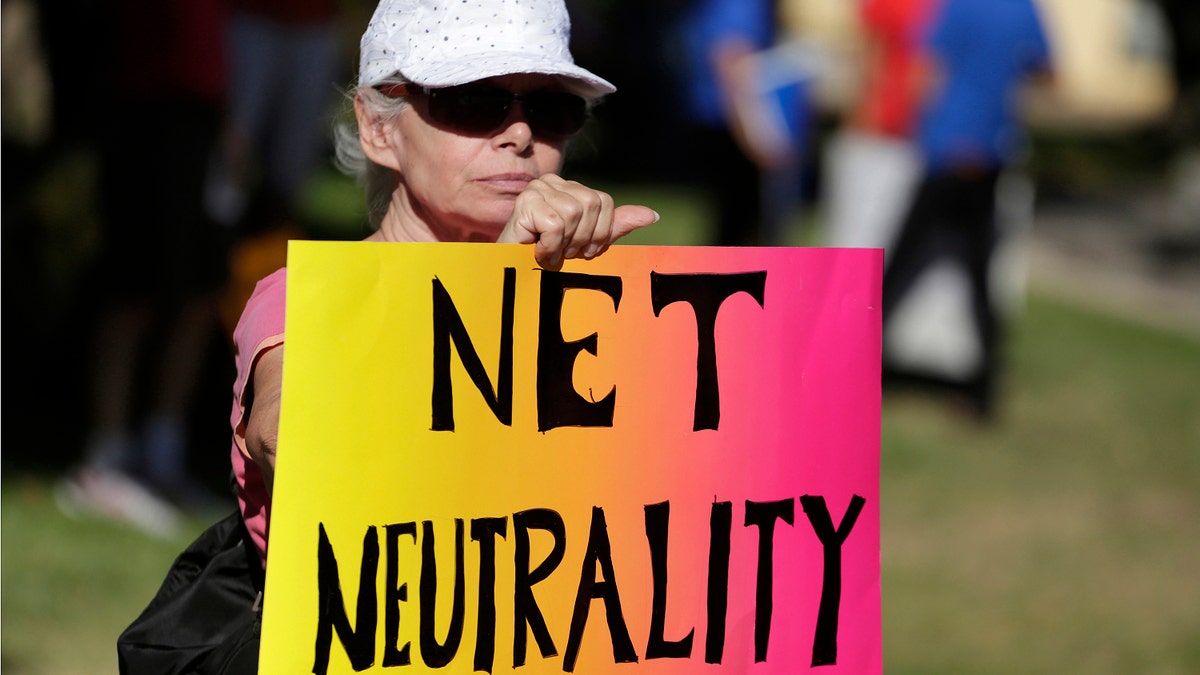
File photo. Lori Erlendsson attends a pro-net neutrality Internet activist July 23, 2014. (REUTERS/Jonathan Alcorn)
The Federal Communications Commission released more than 300 pages of Internet regulations Thursday, which critics say will increase the cost of Internet and slow improvements.
The regulations, which include “net neutrality” rules, were called for by President Obama and approved by a 3-to-2 vote of FCC commissioners. Opponents say the regulations are an illegal bureaucratic power grab, and that if they are allowed to stand in court they will do harm.
“The consequences: higher broadband prices, slower speeds… less innovation, and fewer options for American consumers,” Ajit Pai, a commissioner at the FCC, said in his dissent.
So in plain English, what is in all the 317 pages of new rules?
Paves the way for new taxes
The regulations talk about a new tax on Internet providers in a positive light, noting it could add “to the stability of the universal service fund,” which subsidizes building connections in unprofitable areas.
The new regulations pave the way for new taxes, because they define Internet service providers as “public utilities” – which could subject them to the many taxes levied on phone service companies.
A decision whether to impose the taxes has been deferred to a future regulatory proceeding. Many say it is likely.
“The federal government is sure to tap this new revenue stream soon to spend more of consumers’ hard-earned dollars,” Commissioner Pai wrote.
Policy experts also worry.
"We are more worried than ever about the likely tax consequences from reclassification,” economists Hal Singer of the center-left Progressive Policy Institute and Robert Litan of the Brookings Institution said in a statement to FoxNews.com.
Limits on cheap prepaid Internet service
The FCC declares that it has the power to kill Internet plans that don’t offer unlimited service (such as a cell phone plan the limits Internet use to a certain amount.)
“These plans have enabled millions of low income households to have mobile service,” dissenting Commissioner Pai wrote. “[But] if a company doesn’t want to offer an expensive, unlimited data plan, it could find itself in the FCC’s cross hairs.”
The FCC did not declare the practice illegal, but said regulators would rule on a “case-by-case” basis going forward.
Commissioner Pai worries that could be bad news for people with cheap, limited-service plans.
“Our standard should be simple: If you like your current service plan, you should be able to keep your current service plan,” Pai wrote.
Limits on expanding Internet coverage
Internet companies looking to add capacity will now have to get permission from the FCC.
Commissioner Pai notes: “If one Internet service provider wants to follow in the footsteps of Google Fiber and enter the market incrementally, the FCC may say no. If another wants to upgrade the bandwidth of its routers at the cost of some latency, the FCC may block it.”
“Net neutrality”
The regulations include “net neutrality” rules – which were the main impetus for the new policies. The new rules ban, for instance, a company like Netflix from paying a cable company like Comcast extra money to give its content faster speed. Many worried that if deals like that were ever to happen, it could mean slower service for other websites that didn’t pay a premium. That is now banned. It also stops cable companies from blocking legal Internet content the carrier might not like.
President Obama praised the new regulations.
“Today's FCC decision will protect innovation and create a level playing field for the next generation of entrepreneurs,” he said, noting that some 4 million Americans had written in asking for this regulation.
Dissenting commissioner Pai blames the President for all the new regulations.
“Why is the FCC turning its back on Internet freedom? Is it because we now have evidence that the Internet is not open? No… We are flip-flopping for one reason and one reason alone. President Obama told us to do so,” he said.
But others are happy with the rules.
“This is a win for Team Internet!” the Electronic Frontier Foundation announced on its website. Prohibitions on blocking, throttling, and paid prioritization will go a long way towards protecting Internet users,” the group said.
Unresolved questions
The FCC left many questions about what cable companies may and may not do open-ended.
Commissioner Pai writes: “How will this all be resolved? No one knows… businesses will have to decide for themselves — with… high-priced attorneys and accountants — whether to take a risk.”
Some policy experts agreed.
“Now we shall remain mired in endless lawsuits,” Wayne Crews, vice president of policy at the libertarian Competitive Enterprise Institute, told FoxNews.com.
“The issuance of these 300 pages of rules was an illegitimate, unconstitutional grab of congressional power by unelected bureaucrats,” he said.
“The task now is for Congress not to just react to the net neutrality rules but to go much further and shut down this agency and its outrages.”
The author, Maxim Lott, can be reached on Facebook or at maxim.lott@foxnews.com.




















